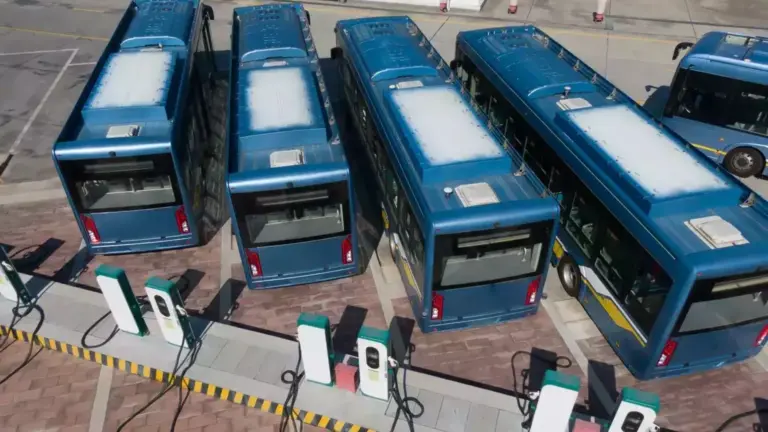About PM-eBus Sewa Scheme
- Under the PM-eBus Sewa Scheme, 10,000 e-buses will be deployed across cities in the country.
- The scheme was introduced to give a push to the slow adoption of e-buses in public transport.
- Support for Operation:
- Under this scheme, city bus operations will be done on a Public Private Partnership (PPP) model.
- This scheme will support bus operations for 10 years.
- States/Cities shall be responsible for running the bus services and making payments to the bus operators.
- The Central Government will support these bus operations by providing subsidies to the extent specified in the proposed scheme.
- Funding:
- It has been allocated a total funding of Rs 57,613 crore.
- Out of this financial provision, the central government will contribute Rs 20,000 crore, while the remaining portion will be covered by the state governments.
- Coverage: It will cover cities with a population of 300,000 and above and will include all the capital cities of the ‘Union Territories, North Eastern Region, and Hill States’.
- There are two segments of the scheme: Augmenting the city bus services and Associated Infrastructure, and Green Urban Mobility initiatives.
- Augmenting the city bus services and Associated Infrastructure: Under this segment, the scheme will augment city electric bus operations by extending Central Assistance (CA) for 10,000 electric bus operation on Public Private Partnership (PPP) model, bus depots and behind-the-meter power infrastructure.
- Green Urban Mobility Initiatives (GUMI): Under this segment, the scheme will support the implementation of GUMI projects for complementing bus services and demonstrating a reduction in Greenhouse Gas (GHG) emissions in urban areas.
- The segment will include support for implementing the National Common Mobility Card (NCMC)-based Automatic Fare Collection System (AFCS), bus priority infrastructure, etc.
Q1) What is the National Common Mobility Card (NCMC)?
This one card will give integrated access to the commuters wherever they travel, whichever public transport they take. The idea of NCMC was floated by the Nandan Nilekani committee set up by the Reserve Bank of India (RBI). NCMC is an automatic fare collection system. It will turn smartphones into an inter-operable transport card that commuters can use eventually to pay for Metro, bus and suburban railways services.
Source: Tenders for e-buses floated under PM-eBus Sewa: Union Urban Affairs Minister
Last updated on February, 2026
→ UPSC Notification 2026 is now out on the official website at upsconline.nic.in.
→ UPSC IFoS Notification 2026 is now out on the official website at upsconline.nic.in.
→ UPSC Calendar 2026 has been released.
→ UPSC Final Result 2025 is expected to be released in the first week of March 2026.
→ Check out the latest UPSC Syllabus 2026 here.
→ Join Vajiram & Ravi’s Interview Guidance Programme for expert help to crack your final UPSC stage.
→ UPSC Mains Result 2025 is now out.
→ UPSC Prelims 2026 will be conducted on 24th May, 2026 & UPSC Mains 2026 will be conducted on 21st August 2026.
→ The UPSC Selection Process is of 3 stages-Prelims, Mains and Interview.
→ Prepare effectively with Vajiram & Ravi’s UPSC Prelims Test Series 2026 featuring full-length mock tests, detailed solutions, and performance analysis.
→ Enroll in Vajiram & Ravi’s UPSC Mains Test Series 2026 for structured answer writing practice, expert evaluation, and exam-oriented feedback.
→ Join Vajiram & Ravi’s Best UPSC Mentorship Program for personalized guidance, strategy planning, and one-to-one support from experienced mentors.
→ Check UPSC Marksheet 2024 Here.
→ UPSC Toppers List 2024 is released now. Shakti Dubey is UPSC AIR 1 2024 Topper.
→ Also check Best UPSC Coaching in India


















